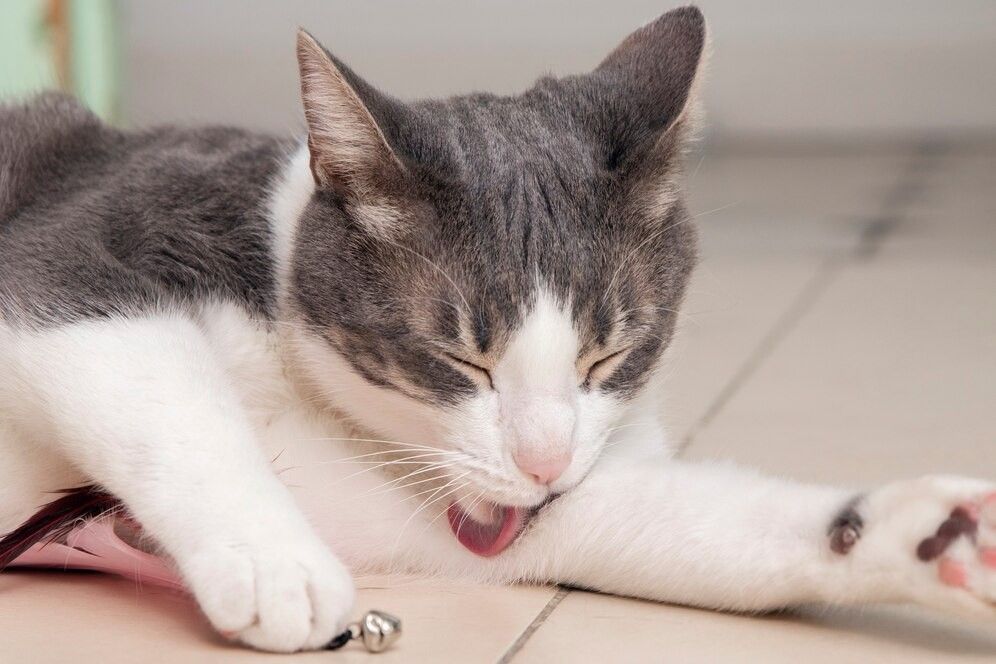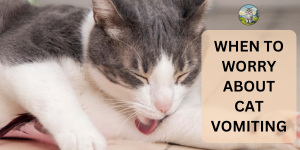Cats sometimes vomit, and for many pet owners, it can be hard to tell if it’s something serious or just a passing issue. Vomiting can happen for many reasons, and knowing when to worry about it is crucial for keeping your cat healthy. While an occasional episode may not be a big deal, frequent or severe vomiting could signal an underlying problem. In this article, we’ll discuss when to be concerned about cat vomiting, common causes, and when to take your cat to the vet.

Why Do Cats Vomit?
Cats may vomit for various reasons, and while some causes are harmless, others can be more serious. Here are some of the most common reasons why cats vomit:
Hairballs
Cats groom themselves by licking their fur, which means they often swallow loose hairs. Over time, this can form hairballs in their stomachs. These hairballs are usually vomited up, and this is normal for most cats. However, if your cat is vomiting up hairballs frequently, it may be a sign of excessive grooming or digestive problems.
Eating Too Quickly
Some cats are fast eaters, and when they eat too quickly, it can cause them to vomit shortly after. The food doesn’t have time to be properly digested, leading to regurgitation. Slowing down their eating, like using a slow-feeder bowl, can help.
Diet Changes or Food Sensitivities
Sudden changes in your cat’s diet or food that doesn’t agree with their stomach can cause vomiting. If you’ve recently switched your cat’s food and notice vomiting, it may be worth reverting to the old food and making changes more gradually.
Eating Foreign Objects
Cats can be curious creatures, sometimes chewing on things they shouldn’t, like plants, strings, or small toys. If they swallow something that their body can’t digest, it could lead to vomiting. In more serious cases, this can cause blockages in their digestive system, which requires immediate veterinary care.
Illness or Disease
Vomiting can be a symptom of more serious health conditions, including kidney disease, liver disease, pancreatitis, infections, or even cancer. In these cases, vomiting is often accompanied by other signs of illness, such as weight loss, diarrhea, or lethargy.
When Should I Be Concerned About My Cat Vomiting?
While an occasional vomiting episode may not be something to stress over, there are certain situations where vomiting is a cause for concern. Here’s a guide to help you know when to worry about cat vomiting:
Frequent Vomiting
If your cat vomits more than once in a single day or if vomiting becomes a regular occurrence over several days, it’s time to call the vet. Persistent vomiting can lead to dehydration, and it often points to a bigger issue, such as an infection, parasite, or gastrointestinal blockage.
Vomiting Blood or Bile
Seeing blood in your cat’s vomit is a major red flag. Fresh, red blood or vomit that looks like coffee grounds could indicate internal bleeding or ulcers. Similarly, yellow or green bile in vomit might suggest issues with your cat’s digestive system, such as inflammation or blockages. Both situations require urgent veterinary care.
Lethargy and Loss of Appetite
Vomiting, coupled with lethargy (unusual tiredness or lack of energy) or loss of appetite, is a concerning combination. If your cat refuses food for more than 24 hours or seems unusually weak, it’s time to take them to the vet.
Weight Loss
If your cat is vomiting frequently and you notice they’re losing weight, it could be a sign of a more serious, underlying condition like hyperthyroidism, kidney disease, or even cancer. Significant weight loss along with vomiting is a strong reason to consult with your vet.
Other Symptoms
If vomiting is accompanied by diarrhea, constipation, trouble breathing, or any change in behavior, it’s important to get your cat checked out. These symptoms together can point to more complex health issues that need medical attention.
When to Take Cat to Vet for Vomiting
If you’re unsure about whether your cat’s vomiting requires a vet visit, here are some general guidelines for when to take your cat to the vet for vomiting:
- Vomiting that lasts more than 24 hours
- Vomiting several times in a short period (more than 2-3 times in a day)
- Vomiting with blood, bile, or any foreign object
- Other concerning symptoms like diarrhea, trouble breathing, or unusual behavior
- Lethargy or refusal to eat for more than a day
- Unexplained weight loss or signs of dehydration
If any of these situations apply to your cat, a trip to the vet is the best course of action. The sooner you act, the better your chances are of catching any serious health problems early.
What to Expect at the Vet
When you take your cat to the vet for vomiting, the vet will likely begin by asking questions about your cat’s recent behavior, diet, and health history. They may then perform a physical exam and suggest some tests to figure out the cause of the vomiting. These tests can include:
Bloodwork: To check for signs of infection, organ function, and dehydration.
X-rays or Ultrasound: To look for blockages or other abnormalities in your cat’s stomach or intestines.
Fecal Exam: To check for parasites.
Urine Tests: To assess kidney health and detect infections.
Once the vet determines the cause of the vomiting, they’ll recommend a treatment plan. This could include dietary changes, medications to manage symptoms, or even surgery in more severe cases.
How to Prevent Vomiting in Cats
While it’s not always possible to completely prevent vomiting in cats, there are some steps you can take to reduce the risk:
Feed Smaller, More Frequent Meals
If your cat tends to vomit after eating too quickly, try feeding them smaller portions more often throughout the day. This can help reduce the chances of overeating and regurgitation.
Hairball Prevention
Regular brushing can help reduce the amount of hair your cat ingests, which may lower the number of hairballs they vomit. You can also find special cat foods or supplements designed to reduce hairball formation.
Keep Dangerous Objects Out of Reach
Make sure to keep small objects, strings, or toxic plants out of your cat’s reach. These items can be tempting for cats to chew on but may cause blockages if swallowed.
Stick to a Consistent Diet
Sudden changes in your cat’s food can upset their stomach and lead to vomiting. If you need to change their diet, do so gradually by mixing in the new food with the old over the course of several days.
Schedule Regular Vet Visits
Routine vet visits can help detect health issues early, preventing vomiting from becoming a symptom of something more serious. Regular check-ups ensure your cat stays in good health.
Frequently Asked Questions (FAQ)
1. How often is it normal for a cat to vomit?
Occasional vomiting, such as once a month, is typically normal for cats, especially if it’s due to hairballs. However, frequent vomiting (more than once a week) should be checked by a vet.
2. What are the common signs of dehydration in cats?
Dehydration symptoms include dry gums, sunken eyes, lethargy, and decreased skin elasticity. If your cat shows any of these signs, especially after vomiting, it’s essential to contact your vet.
3. Can stress cause vomiting in cats?
Yes, stress can cause vomiting in cats. Changes in the household, new pets, or moving can trigger stress-related vomiting. If vomiting occurs alongside other behavioral changes, consult your vet.
4. Should I change my cat’s food if they are vomiting?
Only change your cat’s food if advised by your vet. Sudden dietary changes can upset their stomach further. Introduce new food gradually by mixing it with their current food over several days.
5. Can I treat my cat’s vomiting at home?
Mild vomiting can sometimes be managed by withholding food for 12-24 hours and offering water. However, persistent vomiting, blood, or other symptoms require immediate veterinary care.
6. Why does my cat vomit right after eating?
Fast eating can cause a cat to vomit immediately after meals. Try feeding smaller portions more frequently or using a slow-feeder bowl to help your cat eat at a slower pace.
7. What should I do if my cat vomits a foreign object?
If your cat vomits a foreign object and seems fine afterward, monitor their behavior closely. However, if the vomiting continues or they show signs of distress, take them to the vet for further evaluation.
Conclusion
While vomiting in cats is common, it’s important to know when it becomes a concern. If your cat vomits frequently, shows signs of illness, or has other troubling symptoms, it’s time to consult with your vet. Catching problems early can make all the difference in keeping your cat healthy and happy. For more information on caring for your feline friend, check out cattoptips.
By staying alert and knowing when to take your cat to the vet for vomiting, you can ensure your furry companion stays safe and well.


